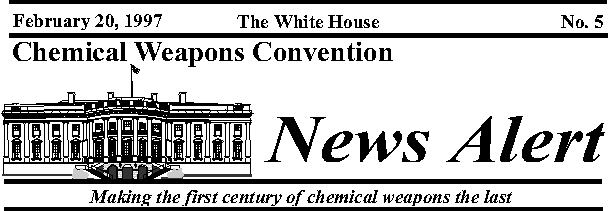|
Veterans organizations and military associations representing millions
of Americans who have served in this nation�s armed forces have endorsed
the Chemical Weapons Convention.
The Veterans of Foreign Wars Commander in Chief James E. Nier said:
�The treaty will reduce world stockpiles
of such weapons and will hopefully prevent our troops from being exposed
to poison gases.... As combat veterans we support this treaty...�
The Vietnam Veterans of America included in its priorities:
�Ratification
of the Chemical Weapons Convention to take a substantive step toward
preventing chemical weapons exposure problems for veterans in the future
similar to those experienced by Persian Gulf War veterans and the
veterans of prior wars.�
The Reserve Officers Association of the United States in a Resolution
declared:
�...failure to ratify the CWC will place us among the great
outlaw states of the world, including Libya, Iran, and North Korea...
�...United States ratification of the CWC will enable us to play a major role
in the development |
and implementation of CWC policy, as well
convince Russia of the desirability of ratifying...
�...the Reserve Officers Association of the United States, chartered by
Congress, urge the Senate to quickly ratify the Chemical Weapons
Convention.�
American Ex-Prisoners of War National Commander William E. �Sonny�
Mottern said:
�...I wish to express my support for the ratification
of the Chemical Weapons Convention. This is an important step in reducing
the price that Americans who serve their country on the field of battle
must pay in defense of our freedom.
�...America must play a leadership role in international efforts
to reduce this price to the extent possible.�
Jewish War Veterans of the U.S.A. National Commander Bob Zweiman
said:
�There are meaningful provisions in the CWC which will afford an
opportunity to impose economic restrictions and sanctions against
those who develop chemical weapons....
�...We are honor bound to protect our Nation and our troops
by minimizing the chances from all obvious or hidden means of
chemical attack in the future.�
|


